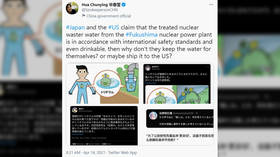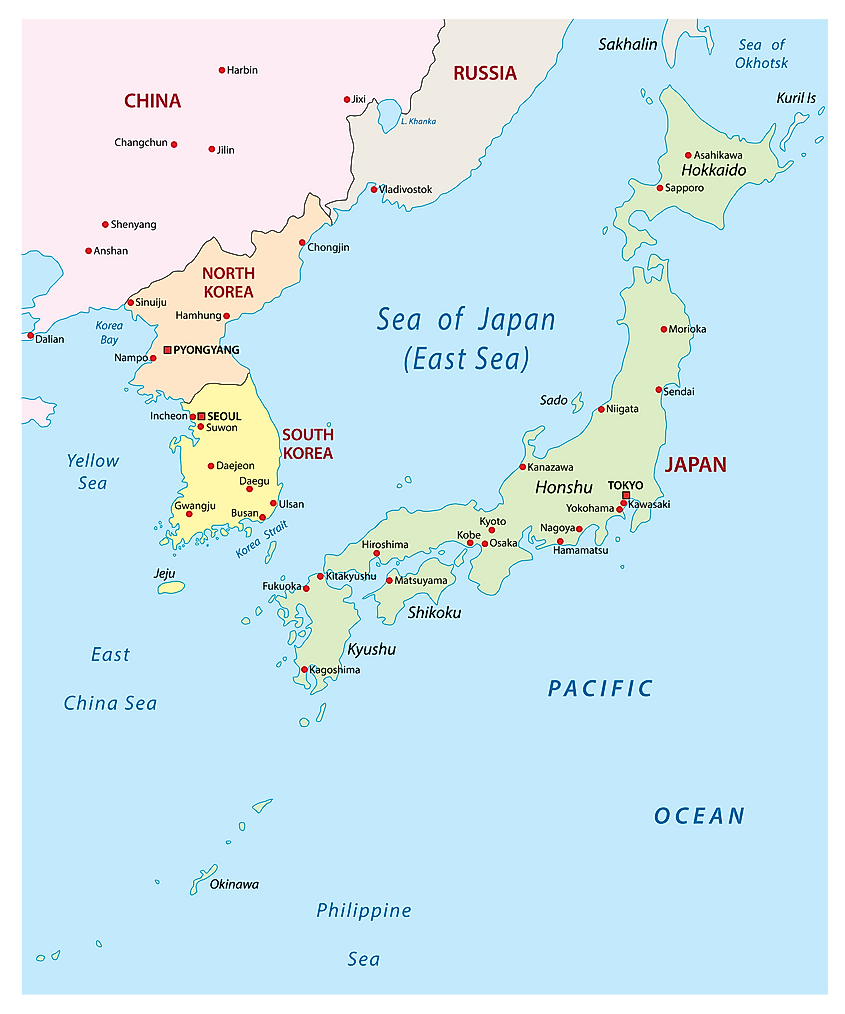Beijing recommends Japan’s nuclear wastewater be shipped to US as Washington backs Tokyo’s plan to dump radionuclides into sea — RT World News
www.rt.com
 In two tweets on Wednesday, Chinese Foreign Ministry spokeswoman Hua Chunying reinforced Beijing’s opposition to Japanese plans to dump more than a million tons of Fukushima’s treated radioactive wastewater in the ocean.
In two tweets on Wednesday, Chinese Foreign Ministry spokeswoman Hua Chunying reinforced Beijing’s opposition to Japanese plans to dump more than a million tons of Fukushima’s treated radioactive wastewater in the ocean.
“Japan and the US claim that the treated nuclear waste water from the Fukushima nuclear power plant is in accordance with international safety standards and even drinkable, then why don't they keep the water for themselves? or maybe ship it to the US?” the spokeswoman wrote, accompanied by cartoons appearing to show how nuclear waste would affect drinking water and human health.
Hua followed up by tweeting that it would be better to have an international assessment of the safety of Japan’s nuclear wastewater before anyone drinks it.
Also on rt.com Beijing slams Japan’s plan for radioactive Fukushima water as ‘extremely irresponsible’
On Monday, Japan announced it would be releasing the wastewater from the meltdown at the Fukushima nuclear plant into the ocean “in around two years.” The plan, which had been widely rumored to be Tokyo’s preferred option, was met with condemnation by Japan’s neighbors.
On Tuesday, Beijing labeled Tokyo “extremely irresponsible” and called for consultations with neighboring countries and relevant parties. South Korea has also protested against the decision.
Also on rt.com South Korea calls in Japanese ambassador to protest decision to dump Fukushima water into ocean
Last year, Greenpeace reported that the wastewater from the plant was more dangerous than the Japanese government had suggested. Their publication titled ‘Stemming the tide 2020: The reality of the Fukushima radioactive water crisis’ claimed the supposedly treated water still contains “dangerous levels of carbon-14,” a radioactive substance that has the “potential to damage human DNA.”
The organization claimed that the Japanese government has incorrectly described the water as “treated,” and has given the impression that radioactive tritium is the only radionuclide in the water. More than 1 million tons of wastewater has been accumulated and treated by the Japanese authorities since the plant’s meltdown more than a decade ago.
Like this story? Share it with a friend!
www.rt.com

“Japan and the US claim that the treated nuclear waste water from the Fukushima nuclear power plant is in accordance with international safety standards and even drinkable, then why don't they keep the water for themselves? or maybe ship it to the US?” the spokeswoman wrote, accompanied by cartoons appearing to show how nuclear waste would affect drinking water and human health.
Hua followed up by tweeting that it would be better to have an international assessment of the safety of Japan’s nuclear wastewater before anyone drinks it.
Also on rt.com Beijing slams Japan’s plan for radioactive Fukushima water as ‘extremely irresponsible’
On Monday, Japan announced it would be releasing the wastewater from the meltdown at the Fukushima nuclear plant into the ocean “in around two years.” The plan, which had been widely rumored to be Tokyo’s preferred option, was met with condemnation by Japan’s neighbors.
On Tuesday, Beijing labeled Tokyo “extremely irresponsible” and called for consultations with neighboring countries and relevant parties. South Korea has also protested against the decision.
Also on rt.com South Korea calls in Japanese ambassador to protest decision to dump Fukushima water into ocean
Last year, Greenpeace reported that the wastewater from the plant was more dangerous than the Japanese government had suggested. Their publication titled ‘Stemming the tide 2020: The reality of the Fukushima radioactive water crisis’ claimed the supposedly treated water still contains “dangerous levels of carbon-14,” a radioactive substance that has the “potential to damage human DNA.”
The organization claimed that the Japanese government has incorrectly described the water as “treated,” and has given the impression that radioactive tritium is the only radionuclide in the water. More than 1 million tons of wastewater has been accumulated and treated by the Japanese authorities since the plant’s meltdown more than a decade ago.
Like this story? Share it with a friend!





